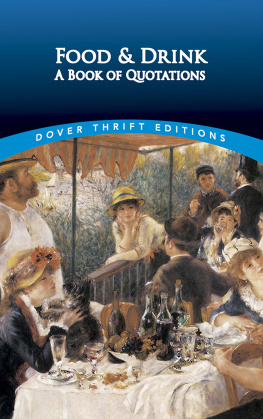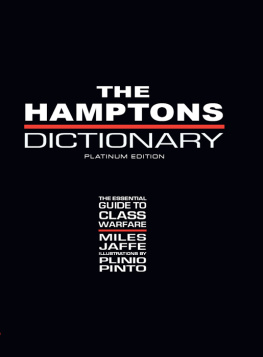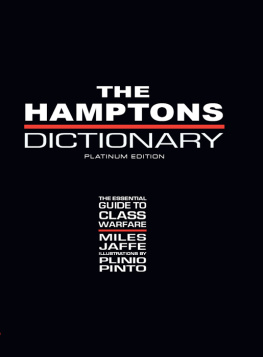
PRAISE FOR DAN RATTINER
If you pick up the East Hampton Star, you'll learn the who, what, and where. The why and how are more likely found in the pages of Dan's Papers If you want to understand the crazy quilt of art, sand, money, farmland, literature, golf clubs, divorces, sea spray, and the area's remarkable blend of ego, generosity, and dedication to historic preservation, read Dan's book, In the Hamptons, and its sequel, In the Hamptons Too.
Alec Baldwin, from the Foreword of In the Hamptons Too
Dan Rattiner has been chronicling the people and events of the Hamptons for as long as I've been going there (since the sixties). If anyone wanted some insight into what made this area such an interesting place, all they'd need was a copy of In the Hamptons. It's as close to rubbing elbows as you can get. Enjoy!
Billy Joel
If there was an honorary mayor of the Hamptons it would have to be Dan Rattiner a raconteur with a wicked sense of humor and an eye for detail.
Long Island History Journal
Also by Dan Rattiner
In the Hamptons
In the Hamptons Too
Still in the Hamptons
MORE TALES OF THE RICH, THE FAMOUS, and THE REST OF US
DAN RATTINER
Cover photo Christian Sumner / iStockphoto
Published by
State University of New York Press, Albany
Copyright 2012 by Dan Rattiner
All rights reserved
Printed in the United States of America
No part of this book may be used or reproduced in any manner whatsoever without written permission. No part of this book may be stored in a retrieval system or transmitted in any form or by any means including electronic, electrostatic, magnetic tape, mechanical, photocopying, recording, or otherwise without the prior permission in writing of the publisher.
For information, contact State University of New York Press, Albany, NY
www.sunypress.edu
Production by Diane Ganeles
Marketing by Fran Keneston
Excelsior Editions is an imprint of State University of New York Press
Library of Congress Cataloging-in-Publication Data
Rattiner, Dan.
Still in the Hamptons : more tales of the rich, the famous, and the rest of us / Dan Rattiner. Excelsior editions.
pages cm
ISBN 978-1-4384-4413-0 (hardcover : alk. paper)
1. Rattiner, Dan. 2. JournalistsUnited StatesBiography. 3. Hamptons (N.Y.)Social life and customs. I. Title.
PN4874.R29A3 2012
974.7'25043092dc23
[B]
2011049984
10 9 8 7 6 5 4 3 2 1
To Rhone and Solange Baker

INTRODUCTION
The Hamptons are a string of beautiful old New England towns strung out on the eastern tip of Long Island that around 1980 began to become a glittering resort filled with movie stars, billionaires, Broadway show producers, artists, and writers.
In 1960, I founded Dan's Papers as a small, weekly newspaper in this community, and at that time Dwight D. Eisenhower was president, there were three channels on TV, cars had tailfins, gas was forty-nine cents a gallon, and the community of local people largely made their living farming, clamming, and fishing. There were also some wealthy bankers who owned mansions on the beach they came out to in the summertime, and there were a few artists and writers living in seclusion in houses tucked away in the woods. The rest of the people coming out here were tourists. Over the years, Dan's Papers grew and soon became the premier newspaper in the community. Also, the Hamptons became the Hamptons.
Having watched this transformation in fascination, I today offer up in these pages a series of original behind-the-scenes stories about some of the people I have met along the way, both plain and fancy, whose lives intertwined with mine, usually, at first anyway, because I wrote the newspaper.
Here you will read about the Annual Artists & Writers Softball Game with Christie Brinkley, Mort Zuckerman, and Alec Baldwin; about adventurer Peter Beard and the loss of his house to fire; about the attempt to have the Hamptons secede from the United States; about the favor done to promote the how-to sex book by Kim Cattrall and Mark Levinson; and about the time Montauk fishing boat captain Carl Darenberg, hired to tow a Coast Guard station on a barge five miles through Gardiner's Bay, had the job go fine until, halfway, a strong wind began to blow and the big house began to head out into the Atlantic on its own.
The people and events I write about are presented here in this memoir in chronological order from 1959 to today, just as I lived them and have remembered them. I hope you enjoy this book, and that it adds to your understanding of what the Hamptons was and has become.
This is the third book in a trilogy of these memories. If you like this book, you will probably also enjoy the earlier ones. In the Hamptons and In the Hamptons Too are more recollections of my interactions with farmers, fishermen, artists, billionaires, and celebrities in the Hamptons, and both of these books, as is this one, are available either online or at local bookstores.
Dan Rattiner
January 2012
Driving Out
T oday the Long Island Expressway extends the full length of the island, and it takes about two hours to drive from Manhattan to the Hamptons. Half a century ago, it was very different. Here is how you drove out from New York City to the Hamptons in 1960.
You went out to your car parked right there on the street in front of your Manhattan apartment, and you drove to the entry of the Queens Midtown Tunnel through heavy trafficthe traffic lights were not yet coordinatedhoping there wasn't a tie-up in the tunnel itself. Cars back then were not built as well as they are today and often broke down. When that happened in the single-lane tunnels, they had to be towed. That presented big problems.
At that time, New York City considered itself the center of the world, and it took that responsibility very seriously. It was the largest city in the world in terms of population. It was where world leaders had decided to build the United Nations. The Empire State Building and the Chrysler Building were the tallest and second tallest buildings in the world, and surely there were more skyscrapers assembled in Manhattan than anywhere else. And in terms of money and the artswith Broadway, the New York Stock Exchange, Greenwich Village, and Madison Avenuethere was little doubt who was number one. The New York Yankees played here, for heaven's sakes.
One thing New York City was not, however, was fun. People would get arrested if they opened a sidewalk cafe. There were not yet banners and ribbons and great busloads of tourists from all over the world. Times Square, not yet family friendly, was a place of prostitutes and peep shows. There were many good neighborhoods around town to be sure, but there were also metal garbage cans that often overflowed, slums filled with immigrants, bad neighborhoods where it was dangerous to walk, and parks filled with weirdos. You didn't go into parks at night. There was also dog poop on the sidewalks. People didn't think anything of it.










